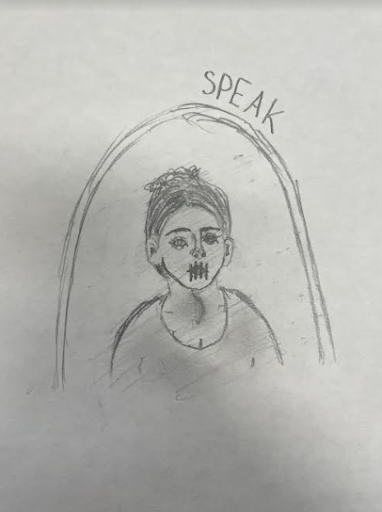
Literature can be adapted in so many ways to convey different aspects of a story. This is a common reason for written works being cinematized. The film versions display a physical view of the story that was not previously available, containing expression, tone of voice and more. Speak (2004) is an excellent movie based on the best-selling novel by Laurie Halse Anderson, which was granted the Golden Kite Award for Fiction. The story follows a 13-year-old girl entering her freshman year of high school and her experience in overcoming one of the most tragic situations a human can be faced with.
The book was originally published in 1999, breaking the boundary of literature for the world. The novel circulated widespread attention for the heavy and influential topics it touched. In the story, the main character is sexually abused by an older boy in her area at a party, and the rest of the story depicts the effect and trauma she was left with, as well as how she ultimately overcame her situation. A likely reason that this piece is so loved today is for the fact that it delivered a voice of unity and understanding for those who have been through the same. In fact, Anderson has shared that she had the goal to spread awareness and understanding of these difficult topics, such as sexual assault, struggles with mental health and discovering individuality throughout adolescence. Anderson absolutely succeeded in this, reaching above and beyond this goal. The story has a beautifully accurate portrayal of the inner demons teenagers face after traumatic events.
Even with as much love as the story received, others were not as fond of the piece. 14 U.S. libraries labeled the novel a banned book in the 2022-23 school year. The piece gathered some criticism, likely based on political opinions. Furthermore, a collection of readers saw the author’s use of profanity and rape as distasteful and inappropriate. Some audiences thought the story to be biased against teenage boys. This is an unfair statement, for as heavy as the novel is, the entirety of it is a reality for many girls. One in nine girls and one in twenty boys experience sexual abuse or assault under the age of 18. To describe this story as tasteless and improper is ignorant, to say the least. With the amount of children who experience this, it is important to provide them with a sense of understanding and companionship. It can become very consuming for one to think they are in a state of isolation.
Furthermore, this kind of literature can be a beneficial resource to those who are trying to recognize and support someone who is experiencing this. Unless one has been through this situation themselves, it is one of the hardest experiences to understand. Pieces like Speak can provide readers with the ability to glimpse into the mind of what a survivor could be going through, allowing them to provide more substantial assistance. Similar situations told through literature include Girl in Pieces by Kathleen Glasgow and The Perks of Being a Wallflower by Stephen Chbosky. While sharing stories of different struggles, all of these show heavily traumatic stories, diving into the minds of survivors globally. Overall, the novel is a beautifully accurate representation of the difficulties many people unfortunately face.
Speak was later adapted into film, released in 2004. The running time of the movie is listed as an hour and 32 minutes, and it was directed by Jessica Sharzer. It is rated PG-13 and categorized as a Drama/Indie film. This release features a young Kristen Stewart, marking the beginning of her acting career. While for the majority of the film Sharzer stayed true to the original novel, there are some substantial differences. There is a principal event in the novel that provides great symbolism to Melinda’s experience. In this sequence, Melinda hangs up a poster of Maya Angelou in her closet. This scene is not featured in the film. This was an important piece of symbolism because it illustrated how Melinda felt unable to vocalize her experience or share her trauma with those close to her, and it revealed how trapped and lonesome she believed herself to be. This scene demonstrated these feelings based on the fact that Maya Angelou was also assaulted and didn’t speak on the event for a very long time. While this may sound negative, there are also many positive occurrences added to the film, which were not featured in the novel.
Overall, both forms of literature of Speak are remarkable stories sharing an unfortunately common traumatic experience, and illustrating the specific perspective of the journey of overcoming the situation. Both adaptations are powerful stories that explore the difficulties people can face when trying to find their own voice after traumatic events. The perspective allows audiences to empathize with the main character’s pain, persistence and her ultimate growth that she is left with. The idea broke boundaries in the literary world, discovering new outlets for artistic expression. Both models of the story offer an impactful scenario, highlighting the power of communication, as well as the mental and emotional strength it requires to reclaim one’s voice.




